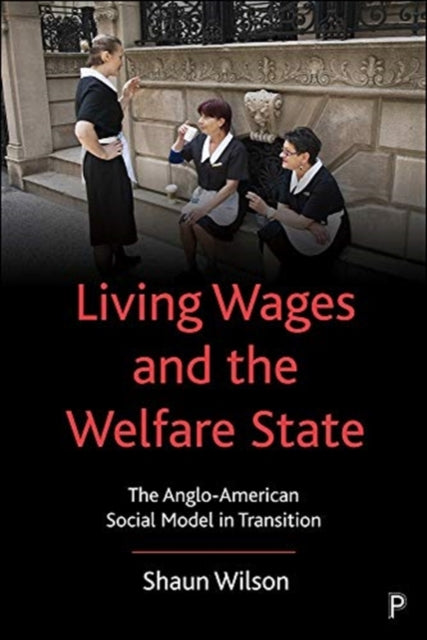ShaunWilson
Living Wages and the Welfare State: The Anglo-American Social Model in Transition
Living Wages and the Welfare State: The Anglo-American Social Model in Transition
YOU SAVE £4.18
- Condition: Brand new
- UK Delivery times: Usually arrives within 2 - 3 working days
- UK Shipping: Fee starts at £2.39. Subject to product weight & dimension
Bulk ordering. Want 15 or more copies? Get a personalised quote and bigger discounts. Learn more about bulk orders.
Couldn't load pickup availability
- More about Living Wages and the Welfare State: The Anglo-American Social Model in Transition
The book "Living Wages: A Political-Economy Narrative" explores the success of Living Wage campaigns in changing welfare state policies and offers an alternative to the Basic Income narrative.
\n Format: Paperback / softback
\n Length: 232 pages
\n Publication date: 10 May 2021
\n Publisher: Bristol University Press
\n
Are living wages an unattainable and cumbersome aspiration or a vital progressive reform? The clamor for equitable minimum incomes has resonated prominently in national discussions, particularly in the aftermath of the COVID-19 pandemic. This timely book delves into the evolving dynamics of minimum wages across various countries, including the United States, the United Kingdom, New Zealand, Canada, Ireland, and Australia. In these regions, workfare policies have forced individuals to seek low-income employment, perpetuating a neoliberal mindset regarding minimum wages. By employing a political-economy lens, this groundbreaking work presents an alternative perspective to the Basic Income narrative. It underscores the remarkable success of Living Wage campaigns as a catalyst for transformative welfare state change.
The demand for living wages has gained significant momentum in recent years, driven by the realization that low wages can have detrimental consequences for individuals, families, and communities. When workers are paid inadequate wages, they are unable to meet their basic needs, such as food, housing, and healthcare. This can lead to a cycle of poverty and inequality, as workers struggle to provide for their families and are unable to escape the poverty trap.
One of the key arguments in favor of living wages is that they can help to reduce poverty and inequality. When workers are paid a fair wage, they are able to afford the basic necessities of life and are less likely to rely on government assistance programs. This can reduce the burden on taxpayers and improve the overall economic health of communities.
Living wages can also have positive impacts on businesses. When workers are paid a fair wage, they are more likely to be productive and engaged in their work. This can lead to increased customer satisfaction, better quality products, and improved business outcomes. Additionally, businesses that pay living wages are more likely to attract and retain talented employees, as workers are more likely to be satisfied with their job and feel valued by their employer.
However, there are also arguments against living wages. Some argue that living wages are too expensive for businesses and can lead to job losses. They argue that businesses will be forced to raise prices or cut back on other expenses, such as benefits, to pay living wages. This can have a negative impact on consumers, as prices will increase and job opportunities will be reduced.
Another argument against living wages is that they may not be effective in reducing poverty and inequality. Some argue that living wages may only benefit a small percentage of workers, while others argue that they may actually increase poverty and inequality by creating a "wage floor" that prevents workers from earning more.
Despite these arguments, there is growing evidence to support the benefits of living wages. Studies have shown that living wages can improve the health and well-being of workers, as well as their families and communities. Living wages can also help to reduce poverty and inequality, as workers are able to afford the basic necessities of life and are less likely to rely on government assistance programs.
In conclusion, living wages are a critical issue that requires careful consideration. While there are arguments against living wages, there is also growing evidence to support their benefits. Living wages can help to reduce poverty and inequality, improve the health and well-being of workers, and benefit businesses by attracting and retaining talented employees. However, it is important to ensure that living wages are implemented in a way that is sustainable and does not harm businesses or consumers. By working together, we can create a more equitable and prosperous society for all.
\n Weight: 356g\n
Dimension: 234 x 156 x 16 (mm)\n
ISBN-13: 9781447341208\n \n
This item can be found in:
UK and International shipping information
UK and International shipping information
UK Delivery and returns information:
- Delivery within 2 - 3 days when ordering in the UK.
- Shipping fee for UK customers from £2.39. Fully tracked shipping service available.
- Returns policy: Return within 30 days of receipt for full refund.
International deliveries:
Shulph Ink now ships to Australia, Belgium, Canada, France, Germany, Ireland, Italy, India, Luxembourg Saudi Arabia, Singapore, Spain, Netherlands, New Zealand, United Arab Emirates, United States of America.
- Delivery times: within 5 - 10 days for international orders.
- Shipping fee: charges vary for overseas orders. Only tracked services are available for most international orders. Some countries have untracked shipping options.
- Customs charges: If ordering to addresses outside the United Kingdom, you may or may not incur additional customs and duties fees during local delivery.


